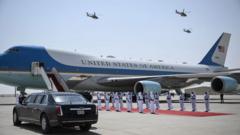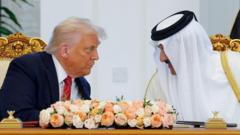Qatar’s push to take control of international table tennis is marred by concerns over transparency and past controversies, as a whistle-blower is detained during the world championships held in Doha.
Qatar's Ambitious Table Tennis Agenda Faces Scrutiny Amid Controversy

Qatar's Ambitious Table Tennis Agenda Faces Scrutiny Amid Controversy
Investigations emerge as a Qatari businessman aims for the international table tennis presidency, highlighted by the detention of a whistle-blower.
In a sparsely populated arena on the outskirts of Doha, Qatar recently hosted the table tennis world championships, featuring elite players showcasing their skills. However, beneath this sporting spectacle, another fierce competition unfolded, as a Qatari businessman endeavored to ascend to the presidency of the International Table Tennis Federation (ITTF). This move aligns with a broader pattern of Gulf nations, including Qatar, seeking to amplify their presence in the world of sports.
With table tennis enjoying immense popularity globally—especially in East Asia—the stakes are high. Interviews with various players and officials expose the growing influence of Qatari interests, prompting worries about the nation's history of lavish spending and allegations of bribery across sports. The situation escalated last week when Georg Silberschmidt, a Swiss whistle-blower known for his opposition to Khalil Al-Mohannadi's candidacy, faced detention at the tournament.
Surrounded by an imposing security detail, Silberschmidt was apprehended after distributing materials advocating for a new players’ union intended to protect athlete rights. This incident adds a layer of complexity to Qatar’s push for dominance in the sport and raises questions about the ethical implications of its involvement in global athletics.






















